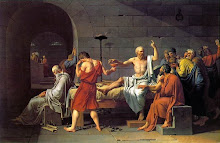I love Mercutio’s Queen Mab speech. It is quite multilayered. Mercutio lays a clever rhetorical trap for a despondent Romeo who falls right into his snare. Remember that Romeo is reluctant to go the masquerade because of his melancholy disposition over his unrequited love for Rosaline. He pleads to Mercutio “But ‘tis no wit to go. I dreamt a dream tonight” (1.4.51,53). Mercutio responds to his friend’s excuse with a rant about a fairy midwife who fulfills the inner desires of dreamers, as she rides across their sleeping bodies in her miniature fantastical carriage.O, then I see Queen Mab hath been with you.
She is the fairies’ midwife, and she comes
In shape no bigger than an agate stone
One the forefinger of an alderman,
Drawn with a team of little atomi
Over men’s noses as they lie asleep. (1.4.58-63)
Wednesday, March 31, 2010
On Queen Mab
Tuesday, March 30, 2010
Great Commercial
My wife absolutely loves this De Beers commercial. She actually looks forward to its reappearance each Christmas. Unfortunately for De Beers, that hasn’t translated into a purchase of their diamonds just yet, but that probably has more to do with… well, anyway, umm, yeah.
What my wife likes most about the commercial is Cat Power’s singing, the tender intimacy of the couple, and especially the husband’s knowing smile at the end of the commercial, that gets her every time. The commercial does a great job of creating a memorable ambience around diamonds. Its timing around Christmas and its targeting of middle-class husbands with sufficient disposable income to buy the product are sure to spur sales, too. Well done, De Beers! Whatever you may think about diamonds, they sure created a winning commercial.
What my wife likes most about the commercial is Cat Power’s singing, the tender intimacy of the couple, and especially the husband’s knowing smile at the end of the commercial, that gets her every time. The commercial does a great job of creating a memorable ambience around diamonds. Its timing around Christmas and its targeting of middle-class husbands with sufficient disposable income to buy the product are sure to spur sales, too. Well done, De Beers! Whatever you may think about diamonds, they sure created a winning commercial.
Monday, March 29, 2010
Blog Blackout, Blood Pressure Scare, Recovering Anna
New sprinklers were installed this Saturday. It was an all-day affair, but the end result is marvelous! Unfortunately, the workers inadvertently cut the cable line, so we had no Internet access over the weekend and won’t until sometime this afternoon when the cable guy repairs it. I apologize for the blog blackout that resulted as a consequence of this mistake. I had been planning to write Saturday’s post on my recent graphic novel kick and Sunday’s post on the curious occurrence of the Feast of the Annunciation and Palm Sunday falling in the same week. I’ll have to take a rain check on those posts.
Friday, March 26, 2010
Media Hit Job on BXVI
Thursday, March 25, 2010
Postmodernism: Epistemic Tribal Warfare
My AP English class is currently making its way through J.M. Coetzee’s Waiting for the Barbarians, a postcolonial allegory set in a frontier post of a nameless Empire. The protagonist, an aged representative of the Empire known only as the Magistrate, finds his comfortable world turned upside down when the Empire sends Colonel Joll of the Third Bureau (the rough equivalent of the CIA in this imaginary world) to determine whether or not the rumors about a barbarian uprising in the frontier lands are true. Colonel Joll quickly rounds up random barbarians and aboriginals and tortures them until they deliver up the “truth” that the Empire demands: the barbarians are preparing for war. Consequently, the Empire prepares a preemptive offensive campaign against the phantom barbarian threat. From this point on, the Magistrate struggles with feelings of alienation from his cultural narrative. The ripple effect upon the Magistrate is immense leading him to a hyper-examination of every aspect of his life including his sexuality, his perception of time and history, his interpretive mode of thinking, his obsession with dream analysis, and a general existential crisis of his individual and collective selfhood.
Wednesday, March 24, 2010
Romeo and Juliet: The Birth, Death, and Resurrection of Tragedy
Today, my students and I begin our study of William Shakespeare’s Romeo and Juliet. Before approaching this wonderfully cathartic masterwork, I think it might be useful to review some key questions pertaining to tragedy. What is the origin and purpose of tragedy? Why did the art form and its attendant aesthetic die out? Why did the tragic mode experience a revival during the Renaissance? How is the Christian aesthetic appreciation of tragedy divergent from the pagan aesthetic?
Tuesday, March 23, 2010
Rhetorical Appeals in Commercials
We have all seen so many commercials that they seem as countless as the stars. But why do some stand out while others are lost in the oblivion of time and memory? This is the question that I posed to my students in Speech class yesterday as we embark upon our new syllabus covering the business applications of rhetoric.
Monday, March 22, 2010
In Sickness and In Health
Anna isn’t feeling well. She has had a low grade fever, a stuffy nose, a persistent cough, and even a mild diaper rash the last few days. The poor thing just cannot seem to catch a break. I hope she feels better soon. :(
Sometimes I don’t know who seems to be in worse shape, though, the sickly child or the worried mother. Fortunately, Jennifer has stayed healthy despite her stress and anxiety over Anna’s physical discomfort. She has her final ultrasound tomorrow to make sure that everything is tracking well with baby #2. We are both getting very excited to meet Sara Lynn!
Sometimes I don’t know who seems to be in worse shape, though, the sickly child or the worried mother. Fortunately, Jennifer has stayed healthy despite her stress and anxiety over Anna’s physical discomfort. She has her final ultrasound tomorrow to make sure that everything is tracking well with baby #2. We are both getting very excited to meet Sara Lynn!
Sunday, March 21, 2010
New Blog Schedule
I am going to experiment with a set routine for the blog. I’ll give it two weeks and then reevaluate. Here’s the proposed schedule:
- Sunday- Meditation on Mass Readings
- Monday- Family Updates
- Tuesday- Teaching Reflection (Speech)
- Wednesday- Teaching Reflection (English 1)
- Thursday- Teaching Reflection (AP English 4)
- Friday- Commentary on Catholic News Item of the Week
- Saturday- Book, Film, or Television Review
- Sunday- Meditation on Mass Readings
Saturday, March 20, 2010
Reflection on "The Godfather"
My AP students have been clamoring to watch movies after the AP exam in May. They argue that it is a time-honored tradition, a veritable sacred cow, which must be preserved and protected at all costs. For a high school experience without movies after the AP is, of course, not a high school experience at all. I didn’t quite cave to these silly rumblings, but I gave them an offer they couldn’t refuse.
Friday, March 19, 2010
Embarrassing Moment of Spring Break
This morning I finished restoring the garage to its former glory. It has been my pet project over Spring Break. It is finally in full working order with everything neatly organized and the floor well swept. It will be the first time in probably -- well, ever-- that we can park both cars in the garage if we so desire. It is certainly the first time in recent memory that there isn’t dirt or fertilizer, or God knows what else, all over the floor. I am proud to report that the garage is no longer a no-go zone. At this, my finest moment, I unwisely decided to do some minor touch-up painting on the pillars on our porch. It all went downhill from there.
Thursday, March 18, 2010
Thoughts on the Legion of Christ
Back during the Jubilee Year in 2000, I had my first encounter with the Legionaries of Christ while I was studying in Europe. One of their priests, Fr. Patrick Murphy L.C., and two brothers at the time, Brother Jonathan (now Fr. Jonathan Morris L.C. who appears as a religious correspondent for FOX News from time to time) and Brother Sebastian, provided spiritual direction to our group of college students. I was very impressed with their orthodoxy and charisma. Our group visited the Legion seminary in Rome and had the opportunity and honor, or so we thought at the time, of meeting the legendary Fr. Marcial Maciel who had founded the order in the 1940s. The young Legionaries had such an awestruck reverence for the man. It was really quite moving. We imagined ourselves in the presence of a truly holy man, a veritable Ignatius of Loyola or Francis of Assisi. I remember thinking there was a spiritual aura about the man. Consequently, I returned home from Europe full of zeal and fervor for the faith, not to mention an unshakable confidence in the Legion. When my Confirmation sponsor, a Jesuit priest, and my mother voiced concern about the Legion, I brushed aside their criticism as being simply misinformed or excessively protective, and advocated for the Legion as a priestly order akin to what the Jesuits used to be. This was hurtful to the priest, as I intended, and I greatly regret those words to this day. That should have been the first sign that something was amiss with the Legion, or at least its founder.
Wednesday, March 17, 2010
Front Lawn Frustration
I have a love-hate relationship with our front lawn. On the one hand, I love the fact that we have such a huge front lawn on our corner lot. Contrary to what my wife may think, I like mowing the lawn and doing yard work, and I steadfastly refuse to pay someone to landscape our yard. It goes against a basic rule of homeownership, owning your home. That may seem pretty basic, but I think owning a home means investing your time, talent, and treasure on personally beautifying your home and making it not only livable, but an enjoyable place to reside. A husband and wife should do this together; they should not delegate it to some random joe blow who doesn’t give two flips about your home, and is just in it to make a buck. Not that I have anything against making a buck. To a landscaper, though, it’s just a house, while to you, it’s a home. Big difference.
Monday, March 15, 2010
A Cinephile's Film Recommendations For Spring Break
At the Teams of Our Lady meeting last Friday, I discussed movies with several of the other members. This conversation made me realize that Jennifer and I really are cinephiles. No, we aren’t lovers of sin, though it does sound an awful lot like that, doesn’t it? We are lovers of cinema. We always enjoyed taking in a good flick during our courtship and first years of marriage, but after Anna was born it became next to impossible to get out much. So, with good investments (sound system, PS3, Roku player) and a little bit of luck (my brother gave us his 40 in. HD TV when he went to Iraq), we had a nice entertainment system and a steady supply of films through Netflix’s streaming video collection. Several of the team members asked me if I might make some recommendations, so here is a list of twelve films from across the globe and across time that you may not have seen, but might find captivating for a variety of reasons. I will provide a brief description of each to help you discern which ones you might like to view. I would also recommend that in the future you consult Rotten Tomatoes when considering whether or not to watch a movie. It isn't foolproof, but it comes close!
Friday, March 12, 2010
Men of St. Thomas: Be a Summa Catholic
St. Thomas Aquinas is best known for his Summa Theologica, a work in which he attempted to explain the totality of the Catholic faith in meticulous detail. Aquinas was not alone, however, in crafting a summa. It was a fascination and preoccupation of many of the best medieval minds. Dante Alighieri, for instance, imagined a pilgrimage through all three realms of the afterlife -- Hell, Purgatory, and Heaven -- in his literary summa, The Divine Comedy. And the architects of Chartres and Notre Dame erected a summa of stone with their encyclopedic telling of the Bible through relief sculpture and stained- glass windows. These men understood that their faith was a comprehensive world view that demanded a total commitment of their time and talent. They might be accurately called Summa Catholics. Every member of the Men of St. Thomas Fraternity at St. Thomas High School should strive to be a Summa Catholic.
Thursday, March 11, 2010
Open Door Mission
It has become something of a tradition at St. Thomas for a speaker to deliver a rather sobering address to the upperclassmen on the eve of Spring Break, presumably to dispel any Bacchanalian plans from the boys’ minds. This year’s speaker, David, is a recovering drug addict and felon from the Open Door Mission. The organization’s web site describes the institution as “a faith-based recovery and rehabilitation shelter dedicated to transforming the lives of the addicted, destitute, homeless or disabled.” A teary-eyed David offered a cathartic recounting of his life’s many missed opportunities, terrible missteps, and frequent misfires.
Wednesday, March 10, 2010
Zombieland
Well, it’s crunch time. Grades are due this afternoon, so I’ll have to keep this post short. The mad dash to finish data entry will not allow for any lengthy rambling today. Bone weary from two days of grading, I punch the Num Lock key and start the humdrum process of plugging numbers onto a glowing screen. The monotonous click-clacking of the keys sends me into a mindless stupor. I honestly feel as if a zombie from one of George A. Romero’s Night of the Living Dead films is taking over my body. My fingers aren’t covered in human blood—yet—but they are certainly stained a crimson hue from hours of grading essays. If I have to read one more horrid piece of prose, I may acquire a taste for human flesh after all. Bwahahaha! Ok, enough histrionics, I better get back to work and make my way through the haze that is slowly creeping into my consciousness clouding my thoughts like a dense Sewanee fog.
Tuesday, March 9, 2010
On Bunburying
“Nothing will induce me to part with Bunbury, and if you ever get married, which seems to me extremely problematic, you will be very glad to know Bunbury. A man who marries without knowing Bunbury has a very tedious time of it.”
Bunburying is a neologism coined by Oscar Wilde in his satirical play, The Importance of Being Earnest. The word functions as both a noun and verb and denotes an alias or the act of using an alias to carry on a clandestine double life. Wilde uses the term to symbolize the chameleon-like nature of modern man who wears different masks according to the various occasions of life. In the play, Algernon and Jack create imaginary personas (Bunbury and Ernest respectively) so they may live as they wish in various social spheres and physical settings. Wilde is not only interested in satirizing late Victorian society’s hypocrisies and absurdities, but in promoting a new relativistic and aesthetic notion of earnestness. The playwright seeks to unveil man to himself as a Nietzschean figure who constructs his own subjective reality, in contrast to one who fulfills a role in an objective order. Personally, I think the tortured artist is just trying to validate his own moral failings as a Bunburyist who abandoned his wife and two children for the life of a pederast. At any rate, this Bunburying business is a very real temptation for modern man.
Monday, March 8, 2010
Teams Of Our Lady
Teams Of Our Lady is an international association of the faithful that promotes a spirituality for married couples. The movement began in France in the late 1930s under the direction of Father Henri Caffarel who devised the system (Ѐquipes Notre Dame) as a means of assisting married parishioners in their call to holiness. In 1947, the movement received a charter from the Vatican, and in 1992, the Pontifical Council for the Laity formally recognized the group as an international association of the faithful of Pontifical right. In the U.S., the group has come to be known as Teams of Our Lady, or T.O.O.L. Jennifer and I, along with six other couples in the Tomball area, formed a new team last fall.
Friday, March 5, 2010
Wichita and Cristo Rey
Catholic educational institutions are here to stay for the middle and upper-class families who have considerable financial resources and fewer kids, thus enabling them to afford the sky-high tuition. Moreover, as long as public schools underperform and promote an ideological agenda, there will continue to be a market for parents looking for more educational options for their children. This leaves the question of what to do about the rest of the Catholic community that either does not earn enough money or opts to have a larger family and so cannot afford Catholic school. School vouchers would be a great boon to Catholic education, but don’t hold your breath waiting for them. The public school teachers' unions are too formidable a special interest group to let such a development occur; besides, the government always attaches strings to any handout, and these would inevitably come into conflict with Catholic teachings. Even without vouchers, however, there are still two business models that might offer a lifeline to Catholic schools in this country: Wichita’s Stewardship Model and the Cristo Rey Network.
Thursday, March 4, 2010
Thank God for Round-Up!
Things are reaching a feverish pitch at St. Thomas as the school goes all out for Round-Up, the annual bid to raise money for student financial assistance. Last year, the school sold $325,000+ worth of raffle tickets. I will be thoroughly impressed if the students best this figure given the stagnant economy, but every time I count the boys out, they somehow manage to pull off the miracle. Round-Up is the beating heart, nay the very soul of this school community, for without this money, a St. Thomas education might not be possible for a full third of our student body. Catholic school doesn’t come cheap. Tuition continues to rise year after year. Personally, I am very conflicted about this phenomenon.
Wednesday, March 3, 2010
Sisyphus and Toys
The existential philosopher Albert Camus wrote a philosophical essay entitled The Myth of Sisyphus on the absurdity of life in a meaningless world. He saw in the mythological account of Sisyphus a wonderful metaphor for the human condition in modernity. Sisyphus defies the gods with his cleverness and even succeeds in staving off death for himself and the rest of humanity for a time by tricking Thanatos and Zeus. Like Prometheus before him, however, Sisyphus’s empathy for man and duplicity toward the gods finally catches up to him in the form of a torturous eternal punishment. Sisyphus is doomed to push a boulder up a steep incline only to see it tumble right back down as he nears the crest of the hill, and so he must labor over and over again to achieve the impossible. However, I am not really interested in Sisyphus as some existential role model, and I have no intention of meditating upon him in this light.
Tuesday, March 2, 2010
On the Good, the True, and the Beautiful
"Indeed, searching for a beauty that is foreign to or separate from the human search for truth and goodness would become (as unfortunately happens) mere asceticism and, especially for the very young, a path leading to ephemeral values and to banal and superficial appearances, even a flight into an artificial paradise that masks inner emptiness." - Pope Benedict XVI
In AP English IV today, we had a heated discussion of Oscar Wilde’s Aestheticism. The flamboyant dandy deliberately sought to divorce beauty from morality and truth with dire consequences for modern sensibilities. I struggled in vain to articulate the connection between the true, the good, and the beautiful to my students. So frustrating! The Holy Father, as usual, displays a laser-like focus in the passage above that cuts to the heart of the matter. These three attributes of God truly are mutually enriching and reinforcing. The renowned philosopher Joseph Pieper eloquently describes this interconnectedness “Beauty is the glow of the true and the good that flows out of every ordered state of being.”
In AP English IV today, we had a heated discussion of Oscar Wilde’s Aestheticism. The flamboyant dandy deliberately sought to divorce beauty from morality and truth with dire consequences for modern sensibilities. I struggled in vain to articulate the connection between the true, the good, and the beautiful to my students. So frustrating! The Holy Father, as usual, displays a laser-like focus in the passage above that cuts to the heart of the matter. These three attributes of God truly are mutually enriching and reinforcing. The renowned philosopher Joseph Pieper eloquently describes this interconnectedness “Beauty is the glow of the true and the good that flows out of every ordered state of being.”
Monday, March 1, 2010
Grading: Bane and Balm
It was the best of times, it was the worst of times, it was the age of wisdom, it was the age of foolishness, it was the epoch of belief, it was the epoch of incredulity… Dickens’s immortal words reverberate within my mind each and every time I sit down before a towering stack of essays. For me, grading is like walking a tightrope over an abyss. I feel as if I am constantly teetering on the precipice of madness or the verge of genius. Sometimes, like Icarus, I experience a meteoric fall to a grisly death, while other times I cross the void and stand as a titan among men. Grading is a very cathartic experience precisely because my mood oscillates between the despair of antique tragedy and the ineffability of Shakespearean comedy. There are times when I want to blot out my eyes and weakly moan to the gods, “No more, no more, will I look upon this world of misery.” There are also times, however, when I honestly hear the celestial choirs of seraphim break forth in sweet hosannas and thank God for the grace of teaching.
Subscribe to:
Posts (Atom)


























